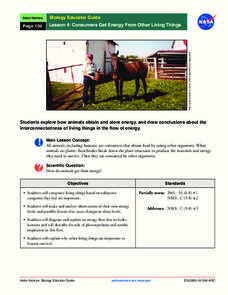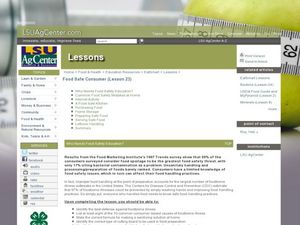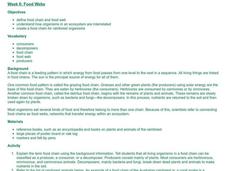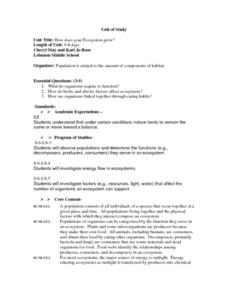Science Geek
Build a Food Web Activity
Entangle your life science class in learning with this collaborative food web activity. Using pictures of the plants and animals native to a particular ecosystem, young biologists work in small groups to construct visual representations...
NASA
Consumers Get Energy From Other Living Things
How do plants and animals get their food? Learn about where energy comes from, how animals store energy, and aerobic respiration, in a instructional activity that allows scholars to diagram energy flows.
Curated OER
it's Lonely At The Top
Students explore the differnences between food producers in food webs and food consumers in food chains. Behavioral choices of primary and secondary consumers such as herbivores, vegetarians, carnivors, and omnivors are analyzed.
Curated OER
Biological Relationships
Create a written document to show knowledge of producers, consumers, decomposers, and symbiotic relationships. To investigate food consumption, your classes will differentiate between types of symbiosis and explain examples of each.
Curated OER
The Science of Sleep and Daily Rhythms: Sleeping in Space
Learners write about strange places that they have slept. In this sleep science lesson students read about astronauts sleeping experience in space. They reflect on unusual places that they have slept and write about it.
National Academy of Sciences
Lights at Night Webquest
Help learners find ways to become more efficient energy consumers. To start, individuals research how different countries address energy efficiency and then analyze their own carbon footprint. They use their research to identify ways to...
EduGAINs
Go H2O! Investigating Residential Water Systems
Before your learners excuse themselves to get a drink at the water fountain, prompt them to think about where that water comes from. A middle school science instructional activity encourages groups to research their community's source of...
Curated OER
Nutrition -- A Lesson for Life - Biology Teaching Thesis
Students briefly explain the importance of nutrition in their everyday lives, and they tell you about how many calories they should consume in a day. They list readily available and affordable healthy foods that they LIKE to eat....
BioEd Online
Good Stress for Your Body
Stress the importance of the different types of pressure our mind and body experience in a lesson about how certain types of stress are actually necessary and good for our bodies. As astronauts and people with injuries can attest, not...
Curated OER
Marine Ecosystems
Students identify producers and consumers and construct a food chain from four marine ecosystems. They describe the delicate balance among organisms in each environment. In groups, students discuss the human activities that upset the...
Advocates for Human Rights
The Right to a Clean Environment in the United States
Even if a school has gone digital, chances are there's still plenty of paper being used. The three activities help scholars learn about the environmental impact of paper and another consumer products of their choosing, the issue of...
Curated OER
Ecosystem Interactions in Refuges
Seventh graders, using national parks as models, illustrate the energy flow in ecosystems. Working in groups, they use murals, flow charts, or other visual displays to record their findings. Students represent the food chains and webs...
Curated OER
Sustainability and Extinction
Galapagos Penguins are the only penguins on earth that live north of the equator (in the wild). In this last lesson plan a discussion on how the Galapagos islands developed their populations and diversity sparks the introduction. Two...
NASA
Biology Training Module
Are you a koalafied biologist? The lesson begins with research about human survival and our ecosystem. Then, an online training module simulates the effects of changes to the plants and animals in an ecosystem. Finally, scholars research...
Alliance Theater
The Jungle Book Post-Show STEAM Lesson
An ecosystem is really just the flow of energy through many different living organisms. A study of Rudyard Kipling's The Jungle Book leads to an environmental science activity in which learners study how various factors can affect...
Curated OER
Interplanetary Travel Guide
In groups of six, middle school space scientists create an imaginative travel brochure for attracting visitors to the planet Mars. Information must include surface features and atmospheric conditions. Although time-consuming, this is a...
Curated OER
Peek at the Chesapeake!
Pupils research organisms that live in the Chesapeake Bay ecosystem. In this science lesson, students choose an organism and research how it is affected by humans. Pupils create a presentation of their findings.
Curated OER
Food Safe Consumer
Students explain how to prepare and keep food safely. In this health science lesson, students research common mistakes and tips for maintaining a clean kitchen. They identify main causes of foodborne diseases.
Curated OER
The Mechanisms of Decay and Decomposition
Eighth graders study how all living things die. They are introduced tot he life cycle and the concept of an ecosystem. Students have a introductory exposure to trophic levels (producer-consumer-decomposer) in the environment.
Curated OER
Arctic Food Web
Students research animals found in the arctic. They discuss what living things need in order to survive and where they get their food. Students discuss the difference between producers and consumers and create a food web for animals in...
Curated OER
Food Webs
Students research rainforest animals and use that information to make a flow chart to show the order in which energy is transferred through several organisms. They label the producers, consumers, and decomposers in their chart.
Curated OER
Mangrove Ecosystem
Eager ecologists explore ecosystems through video and photographs of a Mangrove. They discuss the animals in this habitat and how they interact with each other after reading and discussing "The Sea, the Storm and the Mangrove Tangle."...
Curated OER
Altered Genes
Students describe the economic relationship between farmers, consumers, and food companies. They examine the issues regarding the reactions of consumers in this country and other countries to the use of gene-altered crops in food...
Curated OER
How Does Your Ecosystem Grow?
Students consider that under certain conditions in nature tend to remain the same or move toward a balance. They observe populations and determine the functions (e.g., de-composers, producers, consumers) they serve in an ecosystem. They...
Other popular searches
- Family and Consumer Sciences
- Family Consumer Science
- Consumer Science Foods
- Consumer Science Manners
- Health and Consumer Science
- Consumer Science Fibers
- Consumer Science Fibres
- Fm & Consumer Science
- Family & Consumer Sciences
- Consumer Science Fib Res
- Consumer Science Careers
- Food and Consumer Sciences

























